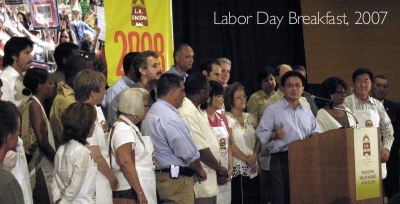In the ongoing political drama over the California state budget (or lack there of) all eyes are currently on State Controller John Chiang. Under the relevant section of voter-approved Proposition 25, Chiang is responsible for making the call on whether the budget that the legislature passed by on the deadline, is “balanced” — a requirement that must be met (on time, and balanced) or else legislators forfeit their pay and per diem going forward until a balanced budget is passed (it is a forfeiture of compensation, by the way, so any pay that legislators do not receive may not be later reclaimed, it is lost forever).
For all of those people who are spending their time trying to do their own analysis to determine whether the budget passed by Senate and the Assembly and quickly vetoed by the Governor was balanced, in order to try to figure out what Chiang will do — I would submit to you that you are looking to both the wrong standard, and the wrong decision maker.

John Chiang, Union Tool
John Chiang is a wholly owned subsidiary of the state’s public employee unions. You can read about that here. Suffice it to say that the unions placed him into this office, and he is wholly dependent on the unions to fund his re-election efforts next year. When you accept the truth of this reality, then you understand that the actual numbers in the budget are not nearly as relevant to Chiang as is his conversations with the bosses of the state’s biggest unions. You can be sure that he will be paying close attention to the signals that they send to him.
So the question you have to ask yourself is this… Do the Labor Unions want legislators to get paid? The easy answer, of course, is that of course they do. The unions are benevolent dictators — and as long as their servants in the legislature continue to do their bidding (which they continue to do with enthusiasm and uniformity), they will take care of them. So it is very likely that the unions “message” to Chiang will be to keep the paychecks flowing.
Or will it be? If you want to get into a little upper-division “stategery” you have to ask yourself whether legislators who are paid or not paid further the specific policy and political objectives of the greedy unions. If you pay the legislators, they will quickly go into a “we have plenty of time” mode — which likely means a longer process, with no immediate pressure to produce an outcome. If you don’t pay them, then watch a bunch of politicians tripping over themselves to come up with a solution quickly.
If you take David Keiffer of the SEIU at his word, then at least that union has no interest in a special election placing taxes on the ballot. Keiffer has been openly critical of that path, saying that he believes that the tax increases would likely fail, and the effort would divert funds from SEIU’s 2012 campaign efforts.
So, you have to ask yourself this question — is a special election with taxes on the ballot more likely in more drawn out process, or in one that is hurried? Once you have the answer to this question, then you know what Chiang will decide about whether this was a balanced budget or not.

